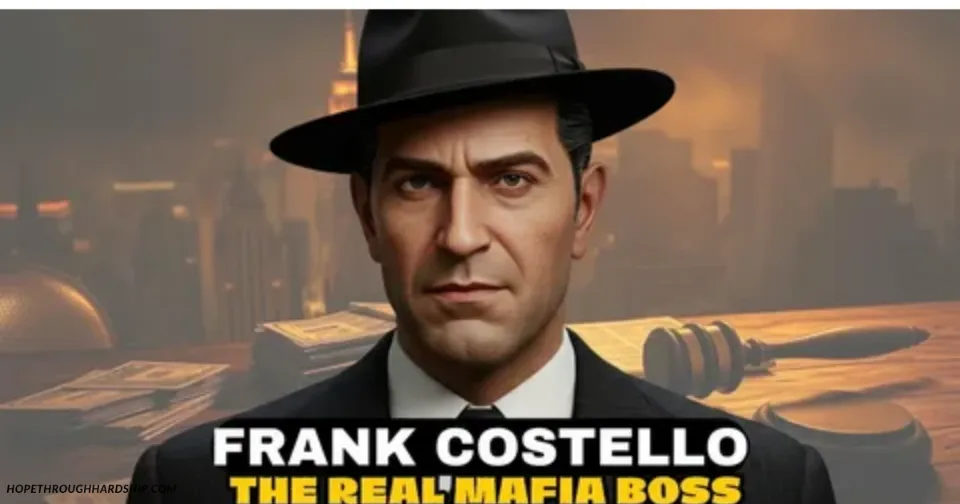Power doesn’t always emerge from violence—sometimes it flows from intelligence, political connections, and strategic brilliance that transforms humble immigrants into billionaire kingpins. When examining America’s most influential organized crime figures, Frank Costello stands apart as a sophisticated orchestrator who wielded influence through diplomacy rather than brutality. Frank Costello accumulated a net worth equal to $1 billion, making him one of history’s wealthiest criminal masterminds. His ascension from Francesco Castiglia, a poor Italian immigrant, to “Prime Minister of the Mob” represents an extraordinary transformation that reshaped American organized crime forever.

Understanding Costello’s legacy requires examining how he revolutionized mafia operations through political corruption, legitimate business fronts, and calculated relationship-building across multiple decades. Unlike contemporaries who relied on intimidation and violence, Costello preferred negotiation, bribery, and strategic partnerships that generated unprecedented wealth while minimizing law enforcement scrutiny. During the 1940s and 1950s, Costello’s ventures, especially gambling, brought in an annual equivalent of $60 billion in today’s economy. His empire extended from bootlegging during Prohibition to controlling gambling operations, political machines, and legitimate enterprises that created sustainable revenue streams. This comprehensive analysis explores how one man’s vision transformed organized crime from street-level thuggery into sophisticated corporate enterprises that influenced American politics, business, and society for generations.
From Italian Immigrant to American Crime Royalty
Francesco Castiglia arrived in New York Harbor carrying nothing but dreams and determination to escape poverty’s relentless grip. Frank “the Prime Minister” Costello was born on 10 February 1891 in Cassano allo Ionio, Calabria, before his family immigrated to America when he was four years old. East Harlem’s tenement buildings became his classroom for street survival, where young Francesco learned lessons about loyalty, territory, and opportunity that formal education couldn’t provide.
The transformation from Francesco Castiglia to Frank Costello symbolized more than name changes—it represented calculated assimilation into American society while maintaining Italian cultural connections. During his teenage years, Costello began associating with neighborhood gangs, learning criminal tradecraft through petty theft, gambling, and protection rackets. However, his exceptional intelligence and natural charisma distinguished him from typical street criminals who focused on immediate gratification rather than long-term strategic planning.
Early criminal experiences taught Costello valuable lessons about risk management, relationship building, and the importance of maintaining respectable public personas. Rather than embracing flashy displays of wealth or power that attracted unwanted attention, he cultivated an image of a legitimate businessman while secretly orchestrating extensive criminal enterprises. This dual identity strategy became his trademark approach throughout his career, enabling him to operate effectively in both criminal underworld and legitimate business circles.
Building an Empire Through Political Corruption
Prohibition created unprecedented opportunities for enterprising criminals willing to supply Americans’ insatiable demand for alcohol, gambling, and entertainment. Costello recognized that sustainable success required more than product distribution—it demanded systematic corruption of law enforcement, judicial systems, and political establishments. During the height of Prohibition, Frank Costello and his cronies were forking over an estimated $100,000 a week in protection money to politicians, judges, district attorneys, and police.
Strategic bribery transformed law enforcement from adversaries into protective allies who ensured Costello’s operations continued without interference. His political network extended from beat cops to commissioners, creating a comprehensive shield against prosecution attempts. Even the New York City Police commissioner, Grover Whalen, was in the pocket of the Mafia, demonstrating the extensive reach of Costello’s corruption network.
Unlike violent contemporaries who relied on intimidation to control territories, Costello preferred diplomatic solutions that created win-win scenarios for all parties involved. His corruption methodology involved identifying key decision-makers, understanding their weaknesses and desires, then providing exactly what they needed to ensure loyalty. This approach created sustainable relationships that lasted decades rather than temporary arrangements that required constant renegotiation through threats or violence.
The Prime Minister’s Business Empire
Costello’s criminal enterprises extended far beyond traditional mafia activities like protection rackets and loan sharking into sophisticated business ventures that generated enormous legitimate profits. His gambling empire included slot machines, bookmaking operations, and illegal casinos that catered to wealthy clientele seeking exclusive entertainment experiences. These ventures required complex logistics, financial management, and customer service that resembled legitimate hospitality businesses more than typical criminal operations.
Diversification became crucial for maintaining steady revenue streams during economic downturns, law enforcement crackdowns, and territorial disputes with rival organizations. Costello invested criminal profits into legitimate businesses, including real estate, restaurants, and entertainment venues that provided both income and perfect covers for money laundering operations. His business acumen enabled him to survive challenges that destroyed less adaptable criminal organizations.
The sophistication of Costello’s operations attracted partnerships with other prominent crime families, creating the foundation for what became known as the National Crime Syndicate. Rather than competing destructively with rivals, he promoted cooperation and territory-sharing agreements that maximized profits while minimizing conflicts. This collaborative approach revolutionized organized crime by replacing chaotic violence with structured business relationships that resembled legitimate corporate partnerships.
Revolutionary Leadership Through Diplomacy
Traditional mob bosses ruled through fear, intimidation, and brutal enforcement of absolute authority over subordinates and territories. Costello pioneered alternative leadership styles that emphasized negotiation, consensus-building, and mutual respect among criminal associates. His diplomatic approach earned him the nickname “Prime Minister” because he preferred resolving disputes through discussion rather than violence.
This revolutionary leadership philosophy attracted exceptionally talented individuals who might have avoided criminal organizations led by volatile, violent bosses. Costello’s organization attracted skilled accountants, lawyers, political operatives, and business managers who contributed expertise that elevated his enterprises above typical criminal operations. His ability to inspire loyalty through respect rather than fear created more stable, productive criminal enterprises.
Diplomatic leadership also enabled Costello to maintain positive relationships with law enforcement, politicians, and legitimate business leaders who might have opposed more aggressive criminal organizations. His reputation for keeping agreements, avoiding unnecessary violence, and conducting business professionally earned trust that facilitated complex negotiations and partnerships across various sectors.
The Kefauver Hearings and National Exposure
Costello’s carefully maintained low profile vanished when Senator Estes Kefauver’s special committee investigating organized crime summoned him for televised hearings in 1951. Costello appeared before the 1951 Kefauver Commission hearings into the mob, which were televised but only showed Costello’s hands as he refused to have his face photographed. This decision to hide his face while testifying created tremendous public intrigue and transformed him into a nationally recognized figure.
The hearings exposed Costello’s vast political connections and the extensive corruption network he had constructed over decades. His testimony revealed sophisticated methods used to influence elections, control judicial decisions, and manipulate law enforcement activities. Americans watched in fascination as Costello’s nervous hands betrayed the tension he felt while answering questions about his criminal enterprises.
National exposure brought unwanted scrutiny from federal investigators who had previously focused on more violent, obvious criminal organizations. The Kefauver hearings marked the beginning of sustained law enforcement pressure that would ultimately force Costello’s retirement from active criminal leadership. However, the hearings also demonstrated the sophisticated nature of his operations and the remarkable influence he had accumulated throughout American society.
Surviving Assassination Attempts and Rival Challenges
Power inevitably creates enemies, and Costello’s diplomatic approach couldn’t prevent all conflicts with ambitious rivals seeking to claim his territories and influence. Frank Costello and Vito Genovese rose together in New York’s Mafia scene. Their lust for power drove them apart, creating dangerous tensions that eventually erupted into open warfare. Genovese’s ambition to control Costello’s organization led to escalating conflicts that threatened to destroy decades of careful relationship-building.
The most dramatic confrontation occurred when Vincent “Chin” Gigante attempted to assassinate Costello outside his apartment building, grazing his scalp with a bullet that could have ended his life. This assassination attempt demonstrated that even diplomatic crime bosses couldn’t completely avoid violence when dealing with ruthless competitors willing to kill for power and money.
Costello’s survival instincts and political connections enabled him to weather these challenges while maintaining control over most of his criminal enterprises. His ability to anticipate threats, arrange protective measures, and negotiate peaceful resolutions prevented total warfare that might have destroyed all parties involved. The assassination attempt ultimately strengthened his position by demonstrating his resilience and determination to maintain his empire.
Legacy of Innovation in Organized Crime
Frank Costello’s impact on American organized crime extended far beyond his personal wealth or territorial control—he fundamentally transformed how criminal organizations operated, structured themselves, and integrated with legitimate society. His emphasis on political corruption over violence created templates that subsequent crime families adopted and refined. Modern organized crime’s sophisticated approach to money laundering, legitimate business integration, and political influence traces directly to strategies Costello pioneered.

The billionaire mob boss demonstrated that intelligence, patience, and strategic thinking could generate more sustainable profits than traditional violent approaches to criminal enterprise. His methods influenced not only American organized crime but also international criminal organizations seeking to operate effectively in democratic societies with complex legal and political systems.
During his retirement, Costello was still known as “The Prime Minister”, indicating the lasting respect he commanded even after stepping away from active criminal leadership. His legacy continues to influence how researchers, law enforcement agencies, and popular culture understand the evolution of organized crime in America. The transformation from street thug to sophisticated criminal executive that Costello achieved became the model for ambitious criminals seeking long-term success rather than short-term notoriety.

